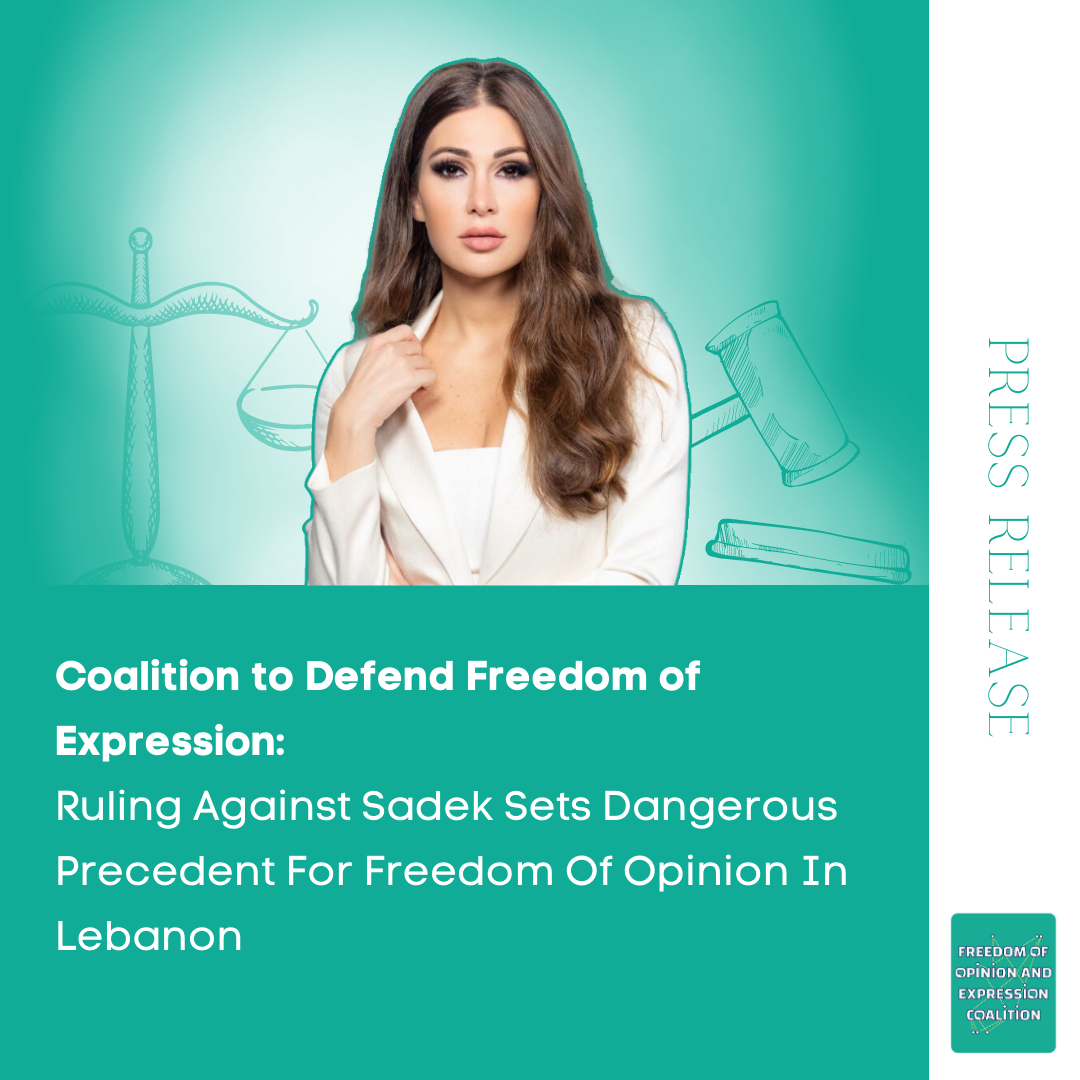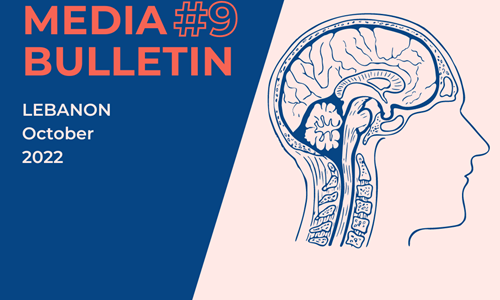
Ruling against Sadek Sets Dangerous Precedent for Freedom of Opinion in Lebanon
The “Freedom of Opinion and Expression Coalition” in Lebanon strongly condemns judicial decisions aimed at suppressing freedom of expression.
On July 10, 2023, Lebanese TV presenter Dima Sadek was found guilty of slander, defamation, and inciting sectarian tensions, in violation of Articles 582, 584, and 317 of the Penal Code. Beirut’s counselor at the Court of Appeal, Judge Rosine Hujaili, delivered the ruling in presence of the concerned parties, sentencing Dima Sadek to one year in prison. In addition, she was fined 110 million Lebanese pounds in compensation for damages to the complainant, the Free Patriotic Movement (FPM) political party. Sadek will also be stripped of some of her civil rights.
In February 2020, the FPM, led by Gebran Bassil, sued Sadek for her tweet accusing the party of Nazism after the party’s supporters assaulted a demonstrator. This judgment stands out as one of the most severe verdicts issued in Lebanon against a case related to freedom of expression. It is also the first case where a ruling of imprisonment is passed against a defendant for their opinions on social media. The Lebanese judiciary has previously issued several judgments in absentia, imposing imprisonment in similar cases. However, in accordance with the Code of Criminal Procedure, these absentia judgments allow for a retrial upon the request of the convicted individual. This is in contrast to in-person judgments, which are enforceable unless appealed.
The Coalition expresses profound concern regarding the judiciary’s acceptance of the legal reasoning put forth by Judge Hujaili in her ruling, which ventured to define the boundaries of legally permissible freedom of expression and criticism without any supporting legal basis. The judge asserted that “freedom of expression and opinion may sometimes fall under the category of freedom of criticism. However, permissible criticism, although occasionally sharp, should be constructive and reform-oriented, aligning with the aspirations of all citizens across society’s various sects and components.” Such a statement violates the general principle of criminal law, which prohibits the imposition of conditions not specified by the law in a penal provision.
Moreover, it contravenes Article 13 of the Constitution and Article 19 of the International Covenant on Civil and Political Rights, which Lebanon has ratified, and both of which safeguard freedom of expression. Furthermore, the ruling has expanded the interpretation of the offense of “inciting sectarian tensions” to apply it to criticizing a political party, as though the party represents a particular sect. The ruling did not consider the seriousness of the actions criticized by Sadek in her tweet.
The judgment also failed to consider the principle of proportionality, as there was an evident imbalance between the alleged criminal act and the severity of the imposed sentence. It overlooked the importance of striking a balance between the public’s social interests and an individual’s right to reputation. Moreover, it lacked the necessary flexibility to allow criticism of public figures involved in governmental affairs. The reasoning employed failed to equalize the power dynamics, disregarding the principle that justifies prioritizing the public interest and freedom of expression over potential harm to the reputation of political parties or influential individuals.
This discrepancy highlights the democratic environment that embraces and accommodates diverse opinions, regardless of their differences. Nonetheless, the judge rejected Sadik’s acquittal on the grounds of the “crime of defamation” committed against public figures and refused to apply Article 387 of the Penal Code, opting for a narrow interpretation that restricted its application solely to cases where “the subject of defamation is an act directly related to one’s occupation and its validity is proven.”
This troubling approach adopted in the ruling will undoubtedly discourage citizens from exercising their rights to express and comment on matters pertaining to public affairs. In the absence of objective criteria to differentiate between lawful and unlawful criticism, individuals may hesitate to freely express their opinions.
Furthermore, Sadek’s verdict comes at a time where respect for human rights is deteriorating in Lebanon. Journalists and activists are frequently being summoned for expressing their opinions and voicing their criticism online.
The growing restrictions on freedoms within the country, combined with weak to nonexistent accountability mechanisms, calls our attention to the dire consequences of such a flawed approach to freedoms. It is crucial to denounce all manifestations of such restrictions in order to uphold our rights.
Therefore, the “Freedom of Opinion and Expression Coalition” expresses deep concern that this ruling may pave the way for further restrictions on freedom of expression and media. Libel and defamation laws under the Penal Code are being weaponized in an escalating manner inconsistent with Lebanon’s obligations under international standards. These standards emphasize the need to abolish laws that permit imprisonment for peaceful expression, especially in cases of defamation, and instead rely on civil compensation as an adequate remedy.
In light of these developments, the “Freedom of Opinion and Expression Coalition” calls upon the Lebanese authorities and relevant parties, such as the Bar Association, to adhere to the constitutional and international standards of freedom of expression. Specifically, they should uphold Article 19 of the International Covenant on Civil and Political Rights, which must not be restricted in a way that undermines its essence.
The Coalition urges the parliament to take immediate action to amend Lebanese laws in order to align them with the country’s international legal obligations. This should include ensuring meaningful consultations with civil society during the process of drafting new laws and ensuring that the proposed legislation incorporates international standards. The Coalition specifically recommends the following:
- Decriminalization of libel, slander, and contempt, making them solely subject to civil liability without the imposition of prison sentences.
- Recognition of truth as a definitive defense in libel and slander cases, regardless of the target of the statements. In cases involving matters of public interest, demonstrating due diligence should be sufficient to establish the truth.
- Restricting criminalization to statements that incite violence, hatred, or discrimination based on national, ethnic, or religious grounds. The law should clearly define the meaning of each of these terms, with guidance from the “Rabat Plan of Action.”
The Coalition emphasizes that “Today, Lebanon is obliged to safeguard freedom of expression and protect the freedom of journalists—those whose duty is to monitor public authorities and hold them accountable. It is shameful that punitive laws continue to be wielded against journalists to silence and prosecute them whenever they fulfill their role of criticizing individuals in positions of power and holding public administration accountable.
Reform in Lebanon cannot be achieved as long laws aimed at protecting journalists, whistleblowers, and others who monitor law enforcement officials are not enacted. The role of these individuals document violations, expose misconduct, and shed light on abuses. The lens of scrutiny is a right bestowed upon those who expose wrongdoing and advocate for justice, not a tool in the hands of those in power to enforce their influence.”
Coalition Members
Alef – Act for human rights
Nakaba Badila
Lebanese Association for Democratic Elections (LADE)
Helem
SMEX
Lebanese Center for Human Rights (CLDH)
The Legal Agenda
Media Association for Peace (MAP)
Amnesty International
Samir Kassir Foundation
Maharat Foundation
MENA Rights Group
Daraj
SEEDS for Legal Initiatives
Human Rights Watch





